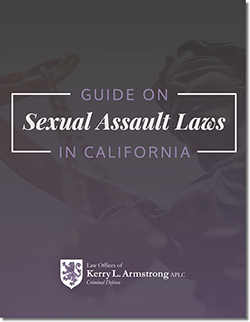
Sexual battery in California has been in the news a lot lately. All allegations of sexual abuse seem to receive more coverage now, and criminal defendants must take decisive action to protect their rights to a fair trial.
At our firm, we aggressively represent the rights of the accused, and we are eager to meet with you. Below, we take a look at California Penal Code 243.4, which is the main sexual battery statute.
If you need help with your case, contact our law firm.
SEXUAL BATTERY | CALIFORNIA LAW
Sexual Battery in California Defined
California Penal Code Section 243.4 defines the offense of sexual battery.
It criminalizes someone touching the “intimate part” of someone else without their consent for the purposes of sexual arousal, gratification, or abuse.
Intimate part includes:
- Sexual organ (penis or vagina)
- Groin
- Anus
- Buttocks
- Female breast
Touching is defined as physical contact with another person’s skin, either directly or through the clothing.
So groping someone fully dressed also qualifies as sexual battery under Penal Code Section 243.4.
In some situations, sexual battery can also include causing another person against their will to masturbate or touch the intimate part of another person for purposes of sexual arousal, gratification, or abuse.
Punishments for Sexual Battery
Generally, the sexual battery in California is a misdemeanor, which is punishable by six months in county jail, a $2,000 fine, or both.
This conviction should show up in criminal background checks.
Punishment can increase depending on the circumstances.

[2020] Guide on Sexual Assualt Laws in California
Download our latest guide on sexual assault laws in California that contains:
- Misdemeanor Sexual Assault: The Basic Crime of Sexual Battery
- Aggravated Forms of Sexual Battery
- Charges Related to Sexual Assault
- Defenses Against a Sexual Assault Charge
Download your copy here.
For example, if the victim is an employee of the defendant, then the fine increases to $3,000.
In other situations, sexual battery can be aggravated by certain factors:
- The victim was unlawfully restrained by the defendant or an accomplice
- The victim was institutionalized for a disability at the time of the sexual battery
- The victim doesn’t know they are being sexually battered because the defendant posed as a professional, such as a doctor
In the case of aggravated sexual battery, the prosecutor can charge the defendant with either a misdemeanor or a felony.
If a misdemeanor, then the defendant faces up to one year in jail and a $2,000 fine.
If charged with a felony, then the defendant faces 2-4 years in prison and up to a $10,000 fine.
Prosecutors will consider many factors when deciding whether to bring misdemeanor or felony charges.
For example, the defendant’s criminal history is relevant, as are the circumstances surrounding the alleged battery.
Also, Penal Code Section 243.4 makes it a crime to cause someone restrained or institutionalized for disability/incapacity to masturbate or touch the intimate parts of another person for sexual gratification, arousal, or abuse.
This crime can be charged as either a misdemeanor or a felony. Punishment is the same as for aggravated sexual battery.
Were you recently charged with a sexual battery charge in California?
Fill out the free and confidential form below describing what you are being charged with. Then, we will contact you to get to work on your case. At The Law Offices of Kerry Armstrong, APLC we don’t see marginally reduced charges as a success.
Registration as a Sex Offender
Those convicted of either a misdemeanor or felony sexual battery in California must currently register as sex offenders for life. Beginning in 2021, their registration requirement will be:
- Misdemeanor or felony conviction: Register as a Tier 1 sex offender for at least 10 years.
Defenses to Charges of Sexual Battery in California
There are many defenses that you can raise to a charge of sexual battery in California. Foremost, you can argue that there is insufficient evidence that you committed the crime.
For example, a victim might not have clearly seen who assaulted her, in which case you can argue the police have the wrong person.
For example, Amy and Justin are standing in line with a concert. Amy feels someone grope her buttock and quickly turns around, her eyes landing on Justin. Though Justin is behind her, he could argue that the person standing behind him could have just as easily groped Amy.
Another defense is consent.
California Penal Code Section 243.4 requires that any intimate touching is against the victim’s will. If the victim consents with words or actions, then it is not battery.
This defense is also available if the defendant had a reasonable belief that he or she had consent.
- Ervin and Carol are on a date when Ervin says he wants to fondle Carol’s breasts. Carol doesn’t say “no” or do anything to show Ervin that she opposes being touched. If Ervin goes ahead and touches Carol’s breast, then he can argue he reasonably believed he had permission.
If you are unsure about what defenses to raise, please contact the Law Offices of Kerry L. Armstrong, APLC today. You can schedule a free consultation with one of our criminal defense attorneys who will review the allegations as you know them.

